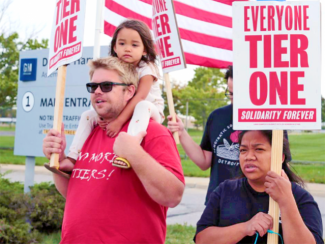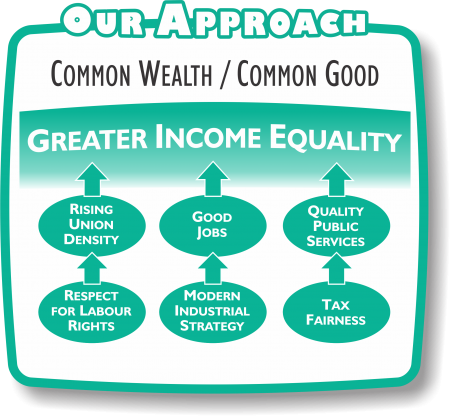STRIKING DIFFERENCE
Strikes bring ‘unbreakable human solitarity’

WORKERS KNOW THEY ARE THEIR OWN BEST FRIENDS. That’s why they go on strike, says Jane McAlevey. That’s why 49,000 UAW (United Autoworkers Union) members went on strike September 16, she says.
“Workers learn to strike and have the confidence to strike by watching other workers strike and win,” says McAlevey, a union organizer, author, and scholar at the University of California at Berkeley’s Labour Center.
“Since the spring of 2018, when 34,000 educators in West Virginia walked off the job, workers in the United States have been reviving the strike, their most powerful tool,” says McAlevey
A clear ‘through line’
McAlevey says you can see “a through line” between the education strikes that began in early 2018 and rolled through the country to Los Angeles and Oakland, the Marriott hotel workers strike, the Stop & Shop strike, the AT&T strike in August and now the nationwide UAW strike.
“The recent wave of strikes show that American labour will fight to regain ground lost to decades of defeats and setbacks, says McAlevey.
“But that rebuilding is happening precisely because workers themselves are doing it, not because national union leaders, labor think tanks, or presidential candidates have newfangled ideas about solving the crisis of inequality.”
Every significant victory for working people came about because of “massive strikes, lots of them” says McAlevey, many before unions were even legal.
In Canada, for example, the 1945 autoworkers strike at Ford in Windsor, Ontario resulted in the “Rand Formula” requiring all workers covered by a union contract to pay dues to that union. The 1935 National Labour Relations Act in the USA, recognizing the right of workers to form unions, was also the result of massive strike action.
“This isn’t complicated,” says McAlevey, “but it is hard and involves risk. It’s the same risk civil rights activists took in the 1950s and ’60s; the risk taken by workers in the ’30s.”
Power begets power
McAlevey is not opposed to considering proposals to “improve” labour relations, such as, placing workers on corporate boards, raising the minimum wage, establishing a universal basic income, and sectoral bargaining. But she says they all “are a distraction from what workers need most: power.”
“Legislative promises without power add up to nothing—and many of the ideas being bandied about now aren’t all that innovative. Just ask today’s older workers.”
She points out that autoworkers in the United States had sectoral bargaining in the 1940s and ’50s, “after they routinized the strike weapon, built deep community alliances, and gained enough power to force big auto companies to sit down with them.”
McAlevey adds: “It took only one law to make that possible: the original 1935 National Labor Relations Act. But it also took guts and, most importantly, worker action.
Forget Europe, says McAlevey, the best example of how workers can win today can be found in the Los Angeles teachers’, Marriott Hotel, and AT&T strikes. In all three cases, she says, workers rebuilt strong unions and developed strategic support within their broader community.
Unbreakable human solidarity
“The Los Angeles teachers won the hardest fight,” she says, “taking on the political elite of the Democratic Party, which fights fiercely against worker equity while pretending to be pro–human rights.
“As for the Marriott strikers, those low-wage, largely immigrant workers did what academics have long declared impossible: took on a major multinational corporation and won.”
The greatest benefit from staging and winning large strikes goes far beyond what the workers get with a win, says McAlevey. The greatest benefit, she says, is something we are all desperate for these days proof of the glory of: “unbreakable human solidarity.”
- 30 -













Add new comment